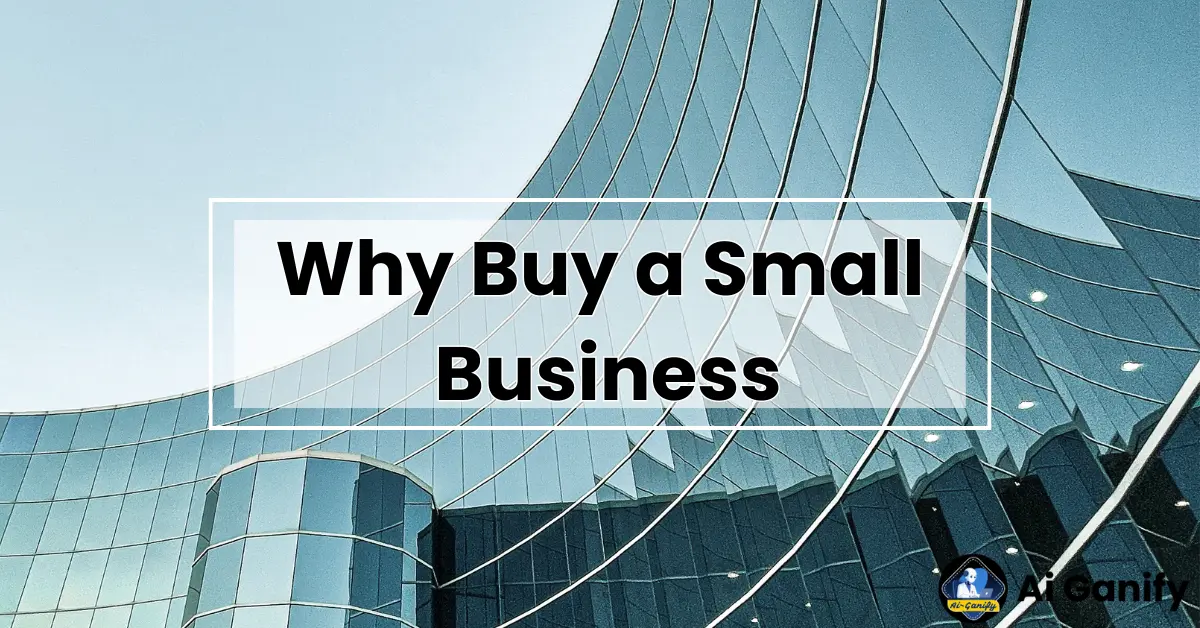
Why Buying an Existing Small Business is a Smart Investment
Skip the Struggles, Start with Success
Starting a business from scratch is exciting, but let’s be honest—it’s also risky and exhausting. You spend months (or years) developing an idea, building a customer base, and hoping it all works out.

Buying a best small business, on the other hand, lets you hit the ground running. Instead of guessing whether your idea will work, you’re stepping into something that’s already proven to be successful.
Why Buying an Existing Business is Less Risky
Most new businesses fail within the first five years. Why?
- Lack of customers
- Unstable cash flow
- High marketing costs
- Tough competition
But when you buy an existing business, you skip those early struggles. You’re getting something that already works, making your investment much safer.
✅ Example: Imagine buying a small coffee shop that has been running for five years. It already has loyal customers, a steady income, and trained employees. You don’t have to start from scratch—you just need to make it better.
The Biggest Advantages of Buying a Small Business
1️⃣ Instant Cash Flow
With a startup, you may go months (or even years) without making a profit. But when you buy a business, you can start making money from day one.
👉 Example: A small e-commerce store with existing traffic and customers means you earn revenue immediately instead of waiting for people to find you.
2️⃣ Existing Customer Base & Reputation
One of the hardest things for new businesses? Attracting customers. But when you buy an established business, it already has a trusted name and regular buyers.
✅ Example: If you buy a local pet grooming service with great online reviews, you don’t have to build credibility—it’s already there!
3️⃣ Proven Business Model & Operational Systems
A startup is full of trial and error, but an existing business comes with:
✔️ A structured workflow
✔️ Reliable suppliers
✔️ Trained staff
This means less stress and faster success for you as the new owner.
4️⃣ Faster ROI (Return on Investment)
With a startup, it could take years before you see any profits. But with a profitable small business, you start getting returns much sooner.
💡 Tip: Look for businesses with strong financials so you can pay off your investment faster.
Key Factors to Consider Before Buying
Before making a purchase, ask yourself:
📌 Is it profitable? (Check revenue, expenses, and profit margins.)
📌 Is it growing? (Look at past trends.)
📌 Can I afford it? (Consider upfront costs and financing options.)
Final Thoughts: A Smarter Path to Business Ownership
Buying a small business is like taking the shortcut to success. Instead of building everything from the ground up, you’re stepping into something that already works.
✔️ Less risk
✔️ Faster profits
✔️ A business with a proven track record
If you’re serious about becoming a business owner, why start from scratch when you can buy something that’s already thriving?
Why Buy a Small Business Instead of Starting One?
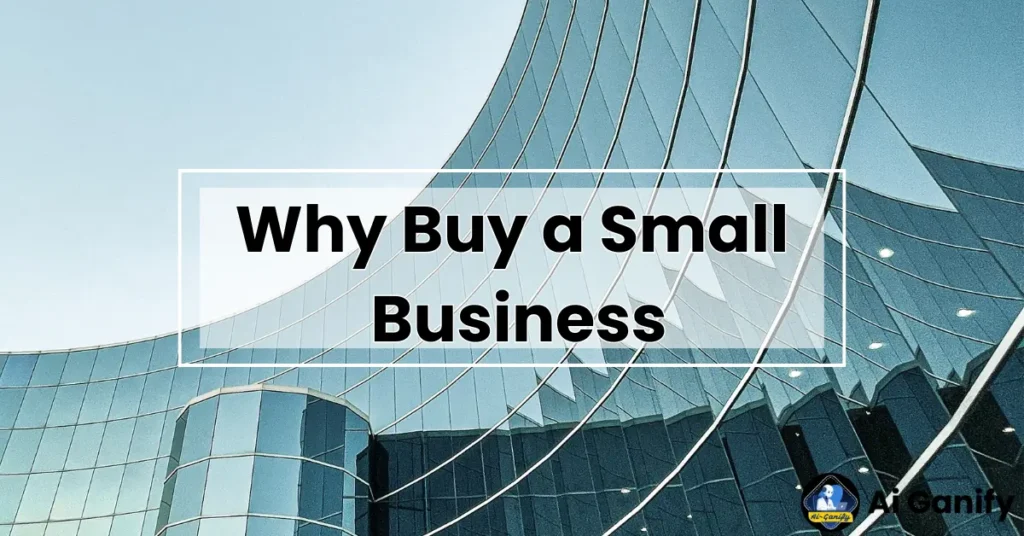
Shortcut to Success: Why Build from Scratch When You Can Buy a Winner?
Starting a business from zero might sound exciting, but it’s also time-consuming, risky, and expensive. Many entrepreneurs spend years building their business, only to struggle with cash flow, customer acquisition, and operational issues.
On the other hand, buying a small business means stepping into something that’s already making money. You’re not guessing whether it will work—you’re taking over something proven to be successful.
Immediate Cash Flow & Stability
Start Making Money from Day One
When you start a new business, you might go months (or even years) without making a profit. But when you buy an existing business, it’s already generating cash flow.
✅ Example: Imagine buying a small bakery that sells 300+ pastries every day. The moment you take over, you start earning revenue. No waiting, no struggling.
💡 Key Takeaway: Buying a business means instant financial stability, instead of hoping customers will come.
Established Reputation & Customer Base
Skip the Hard Work of Building Trust
Building a brand takes years. You need to gain trust, build credibility, and invest heavily in marketing.
But when you buy an existing business, it already has a name, loyal customers, and positive reviews. That means less effort and lower marketing costs.
✅ Example: A well-known local coffee shop already has regulars who visit every morning. You don’t need to convince people to try your coffee—they’re already there.
💡 Key Takeaway: A trusted brand means easier sales, repeat customers, and steady revenue.
Proven Business Model
No Trial and Error—Just a Working System
New businesses go through a lot of trial and error. What pricing works? What products sell best? What marketing strategies convert?
When you buy an established business, these questions are already answered. You inherit:
✔️ A tested business model
✔️ Reliable suppliers
✔️ Efficient operations
✅ Example: If you buy a successful e-commerce store, you already know which products sell best. Instead of guessing, you focus on growth.
💡 Key Takeaway: A proven system lets you skip the struggles of experimentation and go straight to success.
Financing & Investment Advantages
Easier to Get Loans & Funding
Banks and investors are hesitant to fund brand-new businesses because they’re risky. But an established business? That’s a different story.
💰 Lenders are more likely to approve loans when they see:
✔️ A business with steady revenue
✔️ Existing assets and inventory
✔️ A history of profitability
✅ Example: If you apply for a loan to start a business from scratch, you might struggle to get approval. But if you’re buying a profitable laundromat, banks see less risk and are more likely to lend.
💡 Key Takeaway: Established businesses are easier to finance, meaning less stress and more growth opportunities.
Post-Acquisition Strategies
How to Ensure a Smooth Transition & Growth
Buying a business is just the first step. To keep it successful, you need a clear transition plan.
📌 Steps for a Smooth Transition:
✅ Spend the first 30-90 days learning the business.
✅ Meet employees and keep them motivated.
✅ Understand customer expectations and maintain service quality.
✅ Look for quick wins—small improvements that boost profits.
✅ Example: If you buy a restaurant, spend time in the kitchen, meet regular customers, and introduce minor menu upgrades without changing what works.
💡 Key Takeaway: The right strategy protects the business’s success while allowing for future growth and innovation.
Final Thoughts: Why Take the Long Road When You Can Take the Smart One?
Starting from scratch means years of struggle, uncertainty, and risk. But buying a small business lets you jump straight into success.
✔️ Instant cash flow
✔️ A trusted brand & loyal customers
✔️ A proven system with lower risk
✔️ Easier access to funding
If you’re serious about business ownership, buying is the smarter choice. Why build from nothing when you can own something that’s already working?
👉 Also Read: Grow Your Business Fast: Smart Strategies to Avoid Mistakes!
Key Factors to Consider When Buying a Small Business

Buying Smart: What to Check Before Making a Deal
Buying a business isn’t just about picking something profitable. It’s about making the right choice that fits your goals, budget, and long-term success.
A business might look great on the surface, but if you don’t check the right factors, you could end up with hidden financial risks, declining customer demand, or operational headaches.
So, how do you spot a winning business before buying? Let’s break it down.
Financial Health: Is the Business Making Real Money?
Numbers Don’t Lie – Always Check the Finances
A business can look successful, but is it truly profitable? Before buying, you need to analyze:
💰 Revenue Trends – Is income growing, stable, or declining?
📉 Profit Margins – How much does the business actually keep after expenses?
📑 Debts & Liabilities – Are there loans, unpaid bills, or legal issues?
✅ Example: Imagine buying a restaurant. The owner says it makes $20,000/month in revenue. But after rent, salaries, and food costs, the real profit is only $2,000. Is it worth it?
💡 Key Takeaway: If the business isn’t profitable, you might be buying a financial burden, not an opportunity.
Industry & Market Demand: Will the Business Stay Profitable?
Trendy or Timeless? Pick a Business with Long-Term Demand
Some industries are booming, while others are slowly fading away. Before buying a business, ask:
🔍 Is demand increasing or decreasing?
💼 Will this business survive new trends?
🌎 Are there market shifts that could hurt profits?
✅ Example: A local bookstore may have steady sales now, but with more people buying eBooks, will it last? On the other hand, a digital marketing agency is in high demand because businesses need online visibility.
💡 Key Takeaway: Choose a business with growing demand, not one fighting for survival.
Operational Efficiency & Scalability: Can the Business Grow?
Is It Running Smoothly or Full of Problems?
A great business isn’t just about making money today—it should have the potential to grow.
📌 Things to check:
⚙️ How efficient are the daily operations?
👨💻 Does the business rely too much on the current owner?
📈 Can you expand it easily (more locations, online sales, new products)?
✅ Example: If you buy a small bakery, can you open more branches, offer delivery, or sell products online? Or is it limited to one location with no room to grow?
💡 Key Takeaway: A well-run business makes growth easier. A messy, owner-dependent one? That’s a headache.
Risk Factors: What Could Go Wrong?
Spot Hidden Problems Before They Cost You
Even a profitable business can have serious risks. You need to dig deep to avoid surprises.
🚨 Common Red Flags:
❌ Legal Issues – Lawsuits, unpaid taxes, or licensing problems.
📉 Declining Sales – Is the business slowly losing customers?
🛑 Industry Threats – Is competition or technology making it obsolete?
✅ Example: A brick-and-mortar clothing store might be struggling because more people shop online. If sales are declining, will your investment still be worth it?
💡 Key Takeaway: A good business isn’t just about profit today—it must be secure for the future.
Digital Adaptation: Is the Business Ready for the Future?
Modernizing an Old Business for More Growth
Many small businesses struggle because they don’t keep up with technology. If a business isn’t digital, you might need to upgrade it.
📌 Areas to Improve:
🌐 Online Presence – Does it have a website and social media?
📲 E-Commerce Potential – Can you sell products online?
💡 Automation & Digital Tools – Can software reduce workload and improve efficiency?
✅ Example: A local gym might only rely on walk-in sign-ups. But adding online membership options, social media marketing, and fitness apps could boost revenue.
💡 Key Takeaway: A business stuck in the past won’t last. Modernization = More Profit.
Final Thoughts: Buy Smart, Not Blind
Buying a small business is a great opportunity, but only if you do your homework.
✅ Check the finances – Is it really making money?
✅ Analyze the industry – Will it still be profitable in 5 years?
✅ Assess operations – Can it run smoothly without issues?
✅ Spot risks – Are there hidden problems that could hurt you?
✅ Think digital – Can you improve it with technology?
A little research today can save you from massive losses tomorrow. Choose wisely!
Most Profitable Small Businesses to Buy
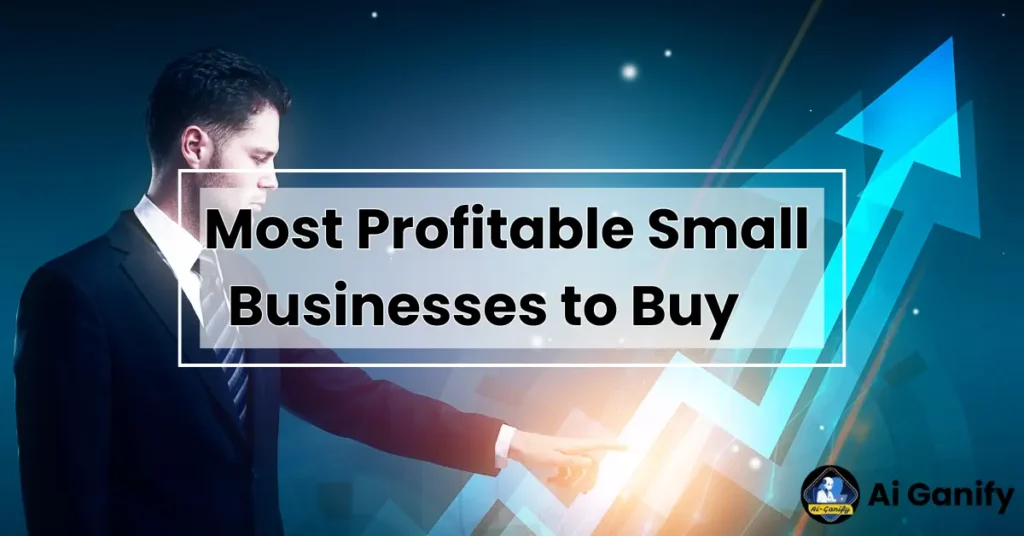
Smart Investments: Which Small Businesses Make the Most Money?
Not all small businesses are created equal. Some make money quickly, while others struggle for years before turning a profit.
If you’re buying a business, you want something profitable, stable, and in high demand.
Here are the best small businesses to buy if you want steady income and long-term success.
Online Businesses & E-commerce
Making Money from Anywhere – The Power of Digital Businesses
Online businesses are booming because they have low startup costs and can run 24/7.
📌 Types of Profitable Online Businesses:
🛍️ Dropshipping – Sell products without handling inventory.
💰 Affiliate Marketing – Earn commissions by promoting products.
📱 Selling Digital Products – E-books, courses, templates, and printables.
✅ Example: Imagine buying a dropshipping store that already makes $5,000/month. You don’t need to worry about inventory, and you can grow sales with better marketing.
💡 Key Takeaway: Online businesses can scale quickly and generate passive income.
Subscription-Based Models
Recurring Revenue – The Secret to Consistent Profits
Subscription-based businesses are goldmines because customers pay every month.
📌 Best Subscription Businesses to Buy:
📦 Box Subscription Services – Monthly product deliveries (snacks, beauty, pets).
💻 SaaS (Software as a Service) – Businesses that sell online tools/software.
📰 Membership Websites – Exclusive content, coaching, or communities.
✅ Example: A meal subscription box business could have 1,000 customers paying $50/month. That’s $50,000/month in predictable income!
💡 Key Takeaway: Recurring revenue = financial stability.
Property Management Services
Earning Money from Real Estate Without Owning It
Real estate is profitable, but you don’t need to buy houses to make money.
Property management companies handle:
🏡 Rental collections & tenant screening.
🔧 Maintenance & repairs for landlords.
📊 Marketing & leasing properties.
✅ Example: A small property management business handling 50 rental units could charge $150 per unit per month, earning $7,500/month in passive income.
💡 Key Takeaway: Property management = steady income without real estate investment risks.
Healthcare & Wellness Services
Booming Demand in an Aging Population
The healthcare industry is growing fast, and people are willing to pay for quality care.
📌 Top Healthcare & Wellness Businesses to Buy:
🏥 Senior Care Services – Assisted living, in-home care, transportation.
🧘♂️ Mental Health Services – Therapy, counseling, wellness coaching.
🏠 Home Healthcare – Non-medical caregiving for elderly or disabled individuals.
✅ Example: A home healthcare business with 20 clients paying $3,000/month could generate $60,000/month in revenue.
💡 Key Takeaway: Healthcare businesses never go out of demand and have high profit margins.
IT & Cybersecurity Firms
Tech is the Future – High Profits, High Demand
With businesses moving online, cybersecurity and IT services are more important than ever.
📌 Profitable IT Businesses to Buy:
🔒 Cybersecurity Firms – Protect companies from hacking and data breaches.
💻 IT Support Services – Help businesses with tech issues and software updates.
☁️ Cloud Services – Managing and securing cloud-based data.
✅ Example: A cybersecurity company that helps 100 small businesses for $200/month makes $20,000/month in recurring revenue.
💡 Key Takeaway: As long as businesses rely on technology, IT and cybersecurity services will always be needed.
High-Margin Local Services
Essential Services People Will Always Pay For
Some businesses aren’t flashy but make serious money because people need them every day.
📌 Top High-Margin Local Businesses to Buy:
🚗 Auto Repair Shops – Cars always need fixing.
🔧 Plumbing & HVAC – Heating, cooling, and plumbing services are always in demand.
🚚 Junk Removal & Cleaning Services – Low costs, high profits.
✅ Example: A plumbing business charging $200 per job and completing 10 jobs a day earns $60,000/month in revenue.
💡 Key Takeaway: Essential services = steady cash flow, high profits, and repeat customers.
Final Thoughts: Buy a Business That Works for You
If you want consistent profits, buy a business that:
✅ Has high demand (People need it year-round).
✅ Generates steady income (Subscription-based, recurring clients).
✅ Has low operational risks (Minimal debt, easy to manage).
✅ Can scale & grow (Can you expand or modernize it?).
These businesses aren’t just profitable—they are smart investments for long-term success.
👉 Related Article: Sell Your Business Fast (Even If You Have No Buyers!)
Most Successful Small Businesses to Buy
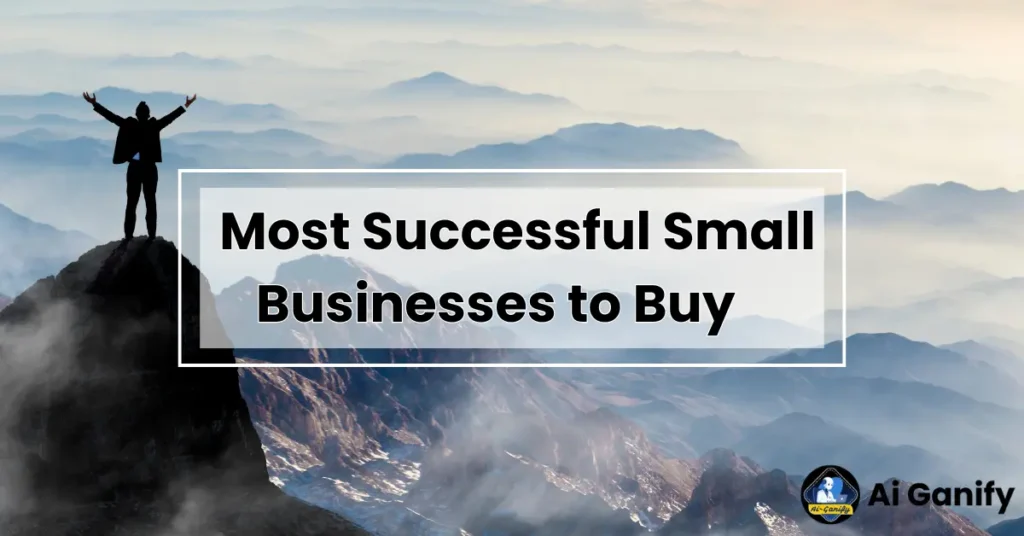
What Makes a Small Business Truly Successful?
Many businesses make money, but only a few stand the test of time and keep growing.
If you’re buying a small business, you need one that is not just profitable but also sustainable.
In this section, we’ll explore the key factors of success and the best business types to invest in.
Factors That Define Success
What Separates a Winning Business from a Failing One?
Not every small business will make it. Some struggle for years, while others grow effortlessly.
Here’s what makes a business successful long-term:
✅ Industry Stability – Does the business operate in a growing or recession-proof industry?
✅ Profitability – Are the profit margins high? Does the business generate steady cash flow?
✅ Market Demand – Do people consistently need the product or service? Is there repeat business?
✅ Brand Strength – Is the business already well-known and trusted?
✅ Scalability – Can the business expand easily without major risks?
💡 Key Takeaway: A business is only truly successful if it can survive economic changes and keep customers coming back.
Best Performing Business Types
Now that we know what makes a business successful, let’s look at the top businesses to buy for long-term success.
Franchises: The Safe & Proven Business Model
Why Build from Scratch When You Can Buy a Recognized Brand?
Franchises are one of the safest business investments.
Why? Because they come with:
✔ Brand Recognition – Customers already trust the name.
✔ Proven Business Model – You don’t need to reinvent the wheel.
✔ Training & Support – The parent company provides marketing, training, and guidance.
📌 Best Franchise Businesses to Buy:
🍔 Fast Food Chains – McDonald’s, Subway, Dunkin’ Donuts.
💪 Fitness Centers – Anytime Fitness, Orangetheory.
🐾 Pet Services – Dog training, pet grooming.
✅ Example: A McDonald’s franchise owner doesn’t need to figure out recipes or marketing—everything is already set up for success!
💡 Key Takeaway: Franchises eliminate guesswork and give you a business that’s already working.
Food & Beverage Businesses: People Will Always Eat & Drink
High Demand, Loyal Customers, and Fast Growth
People love food, and they spend money on it daily.
If managed well, a food or beverage business can be a goldmine.
📌 Best Food & Beverage Businesses to Buy:
☕ Coffee Shops – High-margin drinks with repeat customers.
🚚 Food Trucks – Lower costs than restaurants, but huge profit potential.
🥗 Healthy Meal Services – Fitness-focused food delivery businesses.
✅ Example: A local coffee shop with regular morning customers can make thousands per day just from coffee and pastries.
💡 Key Takeaway: Food businesses work because people eat every day—but choosing a niche with high margins is key.
Education & Tutoring Services: A Business That Grows with Demand
The Learning Industry is Booming!
The demand for education and skill development is growing faster than ever.
📌 Best Education Businesses to Buy:
📖 Tutoring Centers – Math, science, and SAT prep are in demand.
💻 Online Course Platforms – Teach business, coding, or personal finance.
🎨 Skill-Based Learning Centers – Music, art, photography, and dance classes.
✅ Example: A tutoring center helping 200 students a month at $50/session makes $10,000+ monthly revenue.
💡 Key Takeaway: As long as people want to learn, education businesses will keep making money.
Home Improvement & Renovation: The Power of Real Estate Growth
Homeowners Will Always Spend Money on Upgrades
People constantly invest in home improvement.
Whether it’s renovating kitchens, landscaping yards, or fixing plumbing, there’s always a demand.
📌 Best Home Improvement Businesses to Buy:
🔨 Remodeling & Renovation Services – Bathroom, kitchen, and home upgrades.
🌿 Landscaping & Lawn Care – Recurring revenue from maintenance services.
🏠 HVAC & Plumbing Services – High-profit, essential services.
✅ Example: A small home renovation business charging $10,000 per project and completing 3 projects a month makes $30,000 monthly revenue.
💡 Key Takeaway: Home improvement services never slow down—people are always upgrading their homes.
Final Thoughts: Which Business Should You Buy?
To buy a truly successful business, choose one that is:
✅ Stable – The industry isn’t going anywhere.
✅ Profitable – High margins and steady cash flow.
✅ Scalable – Room for growth and expansion.
✅ High in Demand – People need or want the product/service regularly.
If you invest in the right business, you won’t just make money—you’ll build lasting success.
Best Small Businesses to Buy on a Budget
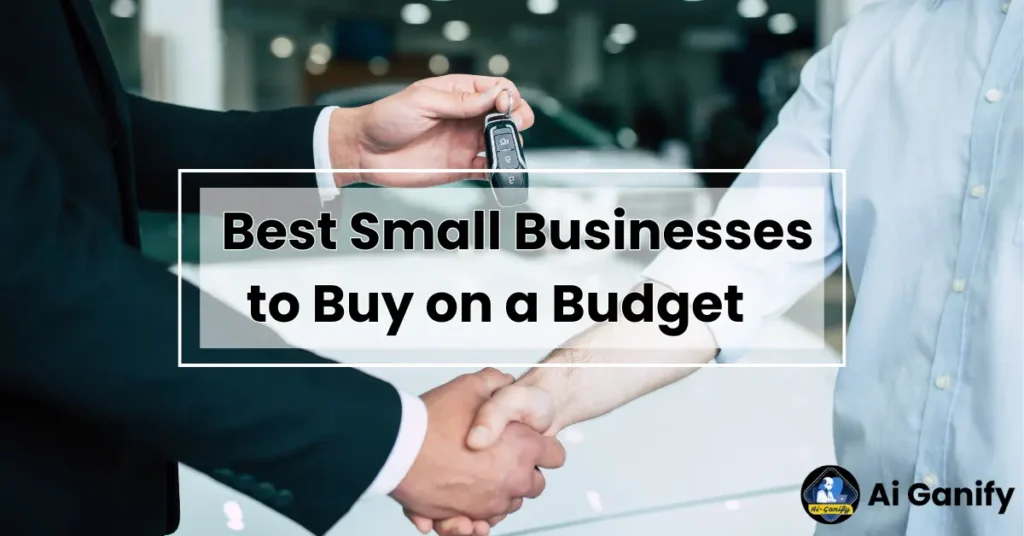
Can You Buy a Small Business Without Breaking the Bank?
Absolutely! You don’t need millions to buy a small business.
In fact, with as little as 1 to 2 lakh ($1,200–$2,500), you can start a profitable business that grows over time.
In this section, we’ll explore affordable business ideas and where to find them at a great price.
Affordable Business Ideas
Low-Cost, High-Profit Businesses You Can Start Today
If you’re on a tight budget, here are some of the best small businesses you can buy or start for under 2 lakh.
1️⃣ Digital Marketing Agency – Start with Just a Laptop!
Why It Works: Every business needs online marketing, and you can start with zero inventory.
💰 Startup Cost: ₹50,000 – ₹1,50,000 ($600–$1,800)
📌 What You Need:
✔ A laptop & internet connection
✔ Basic marketing skills (SEO, social media, ads)
✔ Clients (start with small businesses)
✅ Example: A freelancer managing social media for 5 clients at ₹20,000 each can make ₹1,00,000 per month!
💡 Key Takeaway: You don’t need an office—just skills and the right clients.
2️⃣ Print-on-Demand T-Shirt Business – No Stock, No Risk!
Why It Works: You don’t need inventory—you only pay when a customer places an order.
💰 Startup Cost: ₹30,000 – ₹1,00,000 ($400–$1,200)
📌 What You Need:
✔ A website (Shopify, Etsy, or Printful)
✔ Design skills (or hire a freelancer)
✔ Marketing (Instagram, Facebook Ads)
✅ Example: A simple T-shirt design that sells 50 times a month at ₹500 can make ₹25,000 monthly profit.
💡 Key Takeaway: No upfront inventory means low risk and high profit potential.
3️⃣ Home-Based Bakery or Food Delivery – Turn Cooking into Cash!
Why It Works: If you love baking or cooking, turn your kitchen into a business.
💰 Startup Cost: ₹50,000 – ₹1,50,000 ($600–$1,800)
📌 What You Need:
✔ A home kitchen & required permits
✔ Ingredients & packaging
✔ Social media marketing (Instagram, WhatsApp)
✅ Example: Selling 20 cakes a month at ₹1,500 each = ₹30,000 profit!
💡 Key Takeaway: People love homemade food—use social media to attract customers.
4️⃣ Freelance & Consulting – Get Paid for Your Skills!
Why It Works: If you have a skill, you can sell it online—no big investment needed!
💰 Startup Cost: ₹0 – ₹50,000 ($0–$600)
📌 What You Need:
✔ Skills in writing, design, coding, or consulting
✔ A profile on Fiverr, Upwork, or LinkedIn
✔ A portfolio to showcase work
✅ Example: A writer earning ₹5,000 per article and completing 10 projects a month makes ₹50,000!
💡 Key Takeaway: Your skills = your business. You don’t need an office or inventory!
5️⃣ Car Wash or Mobile Detailing – Simple, Profitable, & Always in Demand!
Why It Works: People want convenience—a mobile car wash comes to them!
💰 Startup Cost: ₹1,00,000 – ₹2,00,000 ($1,200–$2,500)
📌 What You Need:
✔ Cleaning supplies & pressure washer
✔ A vehicle (or a rented van)
✔ Marketing (flyers, Facebook ads)
✅ Example: Washing 10 cars daily at ₹500 each = ₹5,000 per day, ₹1,50,000 monthly!
💡 Key Takeaway: Low-cost business, but high demand and repeat customers!
Where to Find Budget-Friendly Businesses
Finding a Profitable Business Within Your Budget
Now that you know what businesses to buy, the next step is finding them.
Here are the best places to discover budget-friendly opportunities:
🌍 Online Marketplaces
🔹 Flippa – Buy small e-commerce or digital businesses.
🔹 Shopify Exchange – Purchase pre-built online stores.
🔹 Fiverr & Upwork – Find established service-based businesses.
🏙️ Local Listings & Groups
🔹 Facebook Marketplace – Many local business owners sell their businesses here.
🔹 OLX & Craigslist – Look for budget-friendly businesses in your area.
🔹 Small Business Associations – Local chambers of commerce often have business-for-sale listings.
🤝 Networking & Word of Mouth
🔹 Ask friends, family, or local business owners if they know anyone selling a business.
🔹 Attend local business networking events—you might find a great deal!
💡 Key Takeaway: The best deals aren’t always advertised—networking can get you hidden opportunities.
Final Thoughts: The Best Business is the One You Can Afford & Grow!
💡 You don’t need millions to start a successful business.
With as little as ₹1–2 lakh, you can:
✔ Buy a low-cost, high-profit business.
✔ Start small and scale up over time.
✔ Use your skills or local demand to make steady income.
The key is choosing a business with demand, low startup costs, and room to grow.
Where to Find Small Businesses for Sale

Want to Buy a Small Business? Here’s Where to Look!
Finding a good small business to buy isn’t just about having the money—it’s about knowing where to look.
The best businesses aren’t always listed on the first Google search page. Some are hidden gems waiting to be discovered.
Let’s explore the top places where you can find a profitable small business for sale.
Online Marketplaces – The Fastest Way to Find Businesses for Sale
If you want a quick and easy way to buy a business, online marketplaces are your best bet.
These platforms connect business owners looking to sell with buyers like you.
Top Online Marketplaces for Buying Small Businesses
💻 BizBuySell – One of the largest platforms for brick-and-mortar businesses (restaurants, retail stores, etc.).
💻 Flippa – Best for digital businesses like blogs, e-commerce stores, and apps.
💻 Empire Flippers – A premium marketplace for profitable online businesses (Amazon FBA, SaaS, content websites).
✅ Example: If you want to buy a small coffee shop, BizBuySell is your go-to. But if you’re interested in a profitable e-commerce store, check out Flippa.
💡 Key Takeaway: Online marketplaces let you filter businesses by location, revenue, and industry—making the search easier.
Business Brokers – When & Why You Should Use One
If you want a hassle-free buying process, a business broker can help.
Brokers act like real estate agents—but instead of selling houses, they sell businesses.
When to Use a Business Broker
✔ You’re buying a business for the first time and need guidance.
✔ You want a confidential deal (some businesses don’t want their sale to be public).
✔ You need help with negotiations, paperwork, and legalities.
✅ Example: If you’re buying a restaurant or a franchise, a broker can handle licenses, lease agreements, and pricing negotiations.
💡 Key Takeaway: Brokers cost money (they take a commission), but they save you time and reduce risks.
Local Resources & Networking – Find Hidden Business Opportunities
Not every business for sale is listed online. Some of the best deals come through local connections.
Where to Find Businesses for Sale Locally
🏢 Chamber of Commerce – They often know businesses in your area looking to sell.
📢 Networking Events & Meetups – Attend industry events to meet business owners considering retirement or selling.
📰 Local Newspapers & Facebook Groups – Many small business owners don’t list on big marketplaces but use local ads instead.
✅ Example: A profitable dry-cleaning shop may not be listed on BizBuySell but could be advertised in a local newspaper.
💡 Key Takeaway: Word-of-mouth and networking can get you exclusive business deals before they go public.
Industry-Specific Websites – Targeted Search for Niche Businesses
Some businesses are best found on industry-specific platforms rather than general marketplaces.
Best Websites for Different Business Types
🏥 Healthcare – BizQuest & Medfin (For clinics, pharmacies, and medical practices).
💻 SaaS & Tech Startups – MicroAcquire (For software companies, apps, and tech startups).
🏠 Real Estate & Property Management – LoopNet (For rental businesses, property management firms, and commercial real estate).
✅ Example: If you want to buy a rental property business, looking on LoopNet is much better than searching on Flippa.
💡 Key Takeaway: Finding the right marketplace depends on the type of business you want to buy.
Final Thoughts: Choose the Best Source Based on Your Needs
💡 The best place to buy a business depends on what you’re looking for.
✔ Want a quick and easy search? Check online marketplaces.
✔ Need expert guidance? Hire a business broker.
✔ Looking for hidden deals? Network and search local resources.
✔ Buying in a specific industry? Use niche websites.
Steps to Successfully Buy a Small Business
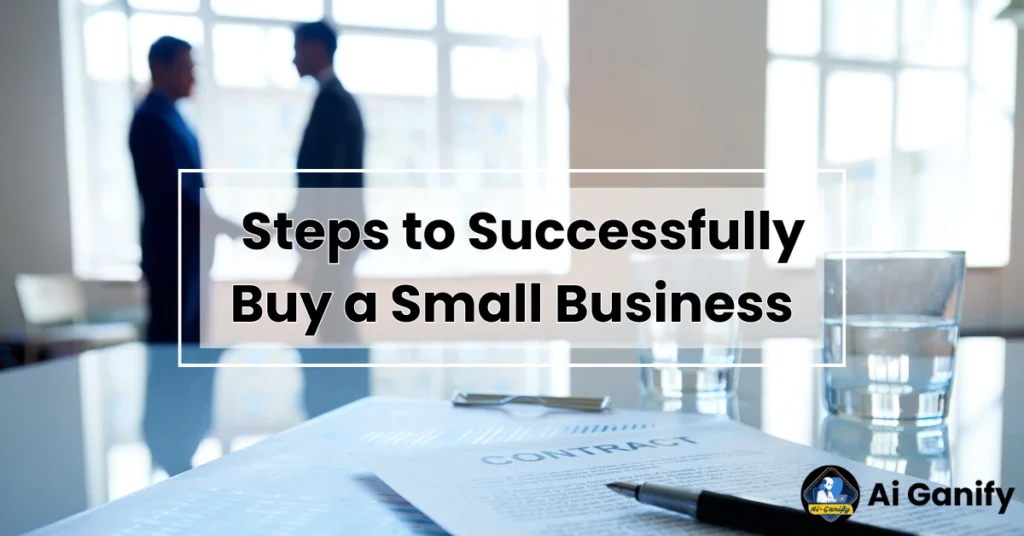
Want to Buy a Small Business? Follow These Key Steps!
Buying a small business isn’t just about paying the price and signing a contract.
It requires careful research, smart negotiation, and a solid plan for success.
Let’s walk through the exact steps to help you buy a business the right way.
Conducting Due Diligence – Avoid Costly Mistakes
Before you buy a business, you must verify everything the seller claims.
This step is called due diligence, and it protects you from hidden problems.
Key Areas to Check Before Buying a Business
💰 Financial Health – Review tax returns, profit & loss statements, debts, and cash flow.
📑 Legal Issues – Ensure the business has no pending lawsuits, unpaid taxes, or contract disputes.
🔧 Operations & Reputation – Check customer reviews, supplier contracts, and employee records.
✅ Example: If a restaurant owner claims $10,000 in monthly profit, but the financial records show $5,000, that’s a red flag!
💡 Key Takeaway: Never trust numbers without verification. Hire an accountant or lawyer if needed.
Negotiation Strategies – How to Get the Best Deal
Most business prices are negotiable. Never accept the first offer.
How to Negotiate the Best Price
✔ Start with Research – Compare prices of similar businesses in the industry.
✔ Ask the Right Questions – Why is the owner selling? Are there any hidden issues?
✔ Use Leverage – If the business has low profits or outdated equipment, negotiate a lower price.
✅ Example: If a coffee shop for sale has old furniture and needs a renovation, you can ask for a price reduction.
💡 Key Takeaway: Smart buyers don’t rush—take your time to negotiate a fair deal.
Financing the Purchase – How to Pay for the Business
Not everyone has cash upfront to buy a business. The good news? You don’t need to!
Best Ways to Finance Your Business Purchase
🏦 SBA Loans – The Small Business Administration (SBA) offers low-interest loans for business purchases.
🤝 Seller Financing – Some owners allow you to pay in installments instead of full payment upfront.
💸 Alternative Funding – Use investors, crowdfunding, or business lines of credit.
✅ Example: If a business costs $100,000, but you only have $30,000, you can finance the rest through an SBA loan or seller financing.
💡 Key Takeaway: You don’t need to be rich to buy a business—explore financing options!
Post-Acquisition Transition Plan – Ensure a Smooth Takeover
After you buy the business, your job isn’t over—it’s just beginning!
A strong transition plan helps keep employees, customers, and operations running smoothly.
How to Successfully Take Over a Business
👥 Build Relationships – Get to know employees, suppliers, and loyal customers.
📈 Keep What’s Working – Don’t make big changes immediately. Observe the business first.
🚀 Improve & Grow – Once settled, focus on marketing, efficiency, and expansion.
✅ Example: If you buy a successful bakery, don’t immediately change the menu—customers love it for a reason!
💡 Key Takeaway: A smooth transition keeps employees happy and customers coming back.
Final Thoughts: Follow These Steps for a Successful Purchase
Buying a business can be life-changing, but only if done right.
✔ Do your research – Conduct due diligence to avoid scams.
✔ Negotiate smartly – Get the best possible deal.
✔ Use financing wisely – Explore loans and seller financing.
✔ Plan the transition – Keep the business profitable after purchase.
👉 Read this: Grow Your Business Fast: Smart Strategies to Avoid Mistakes!
Conclusion
Buying a small business is one of the smartest ways to become your own boss.
You get a business that’s already running, with customers, revenue, and growth potential.
But success depends on making informed decisions.
Key Takeaways – What You’ve Learned So Far
✔ Most successful small businesses are in stable and profitable industries like food, home improvement, and education.
✔ You can buy a business on a budget with options like digital marketing agencies, print-on-demand, or mobile services.
✔ Finding businesses for sale is easier when using trusted online marketplaces, brokers, and networking.
✔ The buying process requires careful steps, including due diligence, negotiation, financing, and transition planning.
Final Considerations – What to Do Before You Buy
Buying a business is a big decision, and it’s important to take your time.
📌 Double-check everything – Financials, legal documents, and business operations.
📌 Have a strategy – Know how you’ll finance the purchase and grow the business.
📌 Trust your instincts – If something feels too good to be true, investigate further.
✅ Example: If a business is selling for way less than market value, ask why before rushing in.
Your Next Step – Take Action Now!
Now that you know what to look for and how to buy a business, it’s time to take the first step.
🔍 Start researching businesses for sale.
💼 Reach out to brokers or owners.
🚀 Make your dream of business ownership a reality!
Explore available businesses and take the first step toward ownership today!
